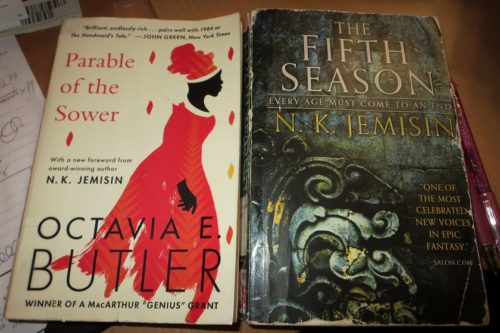
For Black History Month this year I decided to actively celebrate by reading some books by black authors. In addition to a collection of poetry by Langston Hughes, I chose the two books pictured above. Both Butler and Jemisin became famous for writing in a genre that is historically very white and very male, and I was interested to see how these two women of color, born a generation apart, would each approach the SFF genre. I ordered the books separately, without having seen the covers, so it’s serendipitous that Jemisin wrote the introduction to this edition of Parable of the Sower.
I had been meaning to read Octavia Butler’s work for a long time, ever since Orson Scott Card praised her to the moon and back in How to Write Science Fiction and Fantasy. He mentioned her work repeatedly and presented excerpts from her book Wild Seed, about which he wrote, “I’ve chosen this book because nobody handles exposition better than Butler–and also because it’s a terrific novel that you ought to read for the sheer pleasure of it.” About herself, Butler once said…
Who am I? I am a fifty-three-year-old writer who can remember being a ten-year-old writer and who expects someday to be an eighty-year-old writer. I’m also comfortably asocial–a hermit in the middle of Seattle–a pessimist if I’m not careful, a feminist, a black, a former Baptist, an oil-and-water combination of ambition, laziness, insecurity, certainty, and drive.
I love that last part, the “oil-and-water combination of ambition, laziness, insecurity, certainty, and drive.” I feel a kindred spirit there. And I was blown away by her writing from the first paragraph of Parable of the Sower…
I had my recurring dream last night. I guess I should have expected it. It comes to me when I struggle–when I twist on my own personal hook and try to pretend that nothing unusual is happening. It comes to me when I try to be my father’s daughter.
It’s remarkable how much this paragraph tells us about our protagonist Lauren Olamina, and the imagery of twisting on a hook grabs the imagination. The story is set in the 2020s (roughly 30 years in the future, from the author’s point of view). Global warming has turned southern California into a tinderbox, both literally and figuratively. Food and water are scarce and expensive, and jobs are also hard to find. Wealthier communities have walled themselves off from the rest of the world, which has turned so violent that everyone who can afford a gun has one.
Lauren is a black teenager and daughter of a Baptist minister. She has a condition called “hyperempathy,” which causes her to feel (or to imagine that she feels) other people’s pain and pleasure. She lives with her family in a close-knit, walled-off community, but she knows the wall cannot protect them indefinitely. In musing on their perilous state, she has begun to formulate her own religion, called Earthseed, the foundation of which is that God is Change.
All that you touch
You Change.
All that you Change
Changes you.
The only lasting truth
Is Change.
God
Is Change
Lauren’s goal is to build an Earthseed community somewhere up north, where there is said to be more water and opportunity, but first she must survive.
I read this book quickly, because it was good, and I gave it an A grade. But, though it’s well-written and powerful, it’s not for the squeamish. Butler does not shy away from human cruelty, and the story is filled with rape, murder, and even cannibalism. So I can only recommend Parable of the Sower to those readers who have the heart and stomach to endure reading about such things.
Next up is The Fifth Season by N.K. Jemisin. I started following Jemisin on Twitter by some accident of Fate, before I even knew who she was. I have since learned that she is first author to have won the Hugo Award for Best Novel three times consecutively. The awards were for the three books of this series, so I have every reason to expect that this book will be good.

Pingback: 2020’s Most Memorable Reads | Blue-Footed Musings
Pingback: Jam-Packed February | Blue-Footed Musings